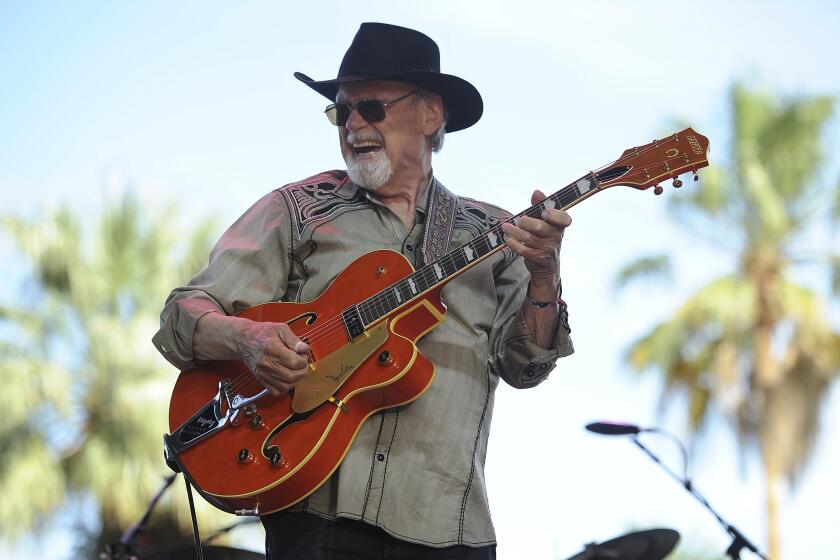DirecTV Saga Nears Finale
Media giant News Corp. was so confident in 2001 that it was going to land the nation’s biggest satellite TV provider that at one point it wrote a press release announcing the deal.
News Corp. was abruptly brought back to earth when a rival company’s higher, 11th-hour bid gained traction with General Motors Corp., which owns the parent of satellite leader DirecTV. Infuriated, News Corp. Chairman Rupert Murdoch withdrew his offer, accusing GM of waffling too many times during a year of negotiations. The next day, an announcement was made of a proposed sale of DirecTV’s owner, Hughes Electronics Corp. of El Segundo, to EchoStar Communications Corp.
Murdoch, however, was determined to get his way.
In fact, after his back-channel lobbying helped kill the EchoStar-DirecTV transaction in Washington on antitrust grounds, Murdoch once again finds himself on the threshold of taking control of the satellite TV leader. The boards of GM and News Corp. are expected to vote today on a multibillion-dollar accord that could give Murdoch his long-coveted U.S. satellite TV asset -- and provide cable operators with a formidable foe.
A vote in Murdoch’s favor isn’t a sure thing, as GM has proved to be a cautious and unpredictable seller. And though few regulatory hurdles are seen, the federal review process could take nine months or more.
For the Australian-born media mogul, DirecTV would fill a gaping hole in News Corp.’s global satellite TV empire, which reaches every other corner of the world, including China, India, the Middle East, Europe and Latin America.
If Murdoch is successful, he is expected to use his satellite expertise to vastly expand DirecTV -- and rattle the cable industry’s dominance of the U.S. subscription TV business. News Corp. probably would draw upon its own programming stockpile to create channels and exclusive programming that could broaden the reach of DirecTV, which serves 11.3 million subscribers and thus is the nation’s third-largest pay-TV provider, after Comcast Corp. and Time Warner Cable.
But News Corp. needs DirecTV for more than just reach: The company sees the purchase as a defensive move against the growing clout of cable TV distributors.
Program suppliers such as News Corp. could lose ground against cable TV distributors as continued consolidation puts more subscribers into fewer hands.
Comcast, which acquired AT&T; Broadband late last year to become the industry leader, serves 22 million cable TV customers, or nearly a third of the nation’s 75 million or so pay-TV homes. That clout gives it the power to launch new channels, undercutting existing suppliers such as News Corp. Sources say Comcast is interested in launching regional sports channels -- a News Corp. mainstay -- in major cable markets such as Boston, San Francisco, Chicago, Seattle, Atlanta and Denver.
Curbing escalating programming costs, particularly those charged by sports programmers such as News Corp., is also a top priority for Comcast -- and the entire cable industry.
Time Warner Cable recently dropped two Fox regional sports channels, in Florida and Minnesota, rather than cave in to News Corp.’s demands for steep rate increases. The two firms reached an agreement after a blackout that lasted several months.
“The company is not going to get the kind of rate increases it had expected,” said Jessica Reif Cohen, an analyst at Merrill Lynch.
DirecTV could help News Corp. blunt the effects of these battles, analysts say, by threatening to drop channels owned by cable operators that balk at rate increases or try to otherwise challenge Murdoch’s empire.
Even without a pay-TV outlet in the U.S., Murdoch has earned a reputation as one of cable’s most cunning adversaries. Typically, when a cable operator threatens to drop one of its channels in protest of a rate increase, News Corp. goes on the offensive, urging viewers to complain and jam distributors’ switchboards. The technique has become standard operating procedure in the industry.
News Corp.’s tactics are one reason many in the cable industry were quietly rooting for EchoStar to win DirecTV, viewing the satellite rival as less of a threat than Murdoch. While EchoStar has used low prices as a competitive edge, Murdoch has sought to increase his grip on the market by improving service.
News Corp.’s British Sky Broadcasting, for example, has become the dominant pay-TV provider in Britain, in part by securing exclusive rights to soccer’s Premier League and by rolling out digital interactive services that allow betting, banking, voting and shopping with the click of a remote control. That has helped give BSkyB one of the best records in retaining customers in the world. Its annual “churn” -- the rate of customer turnover -- is about 9.6%, or roughly half DirecTV’s, according to a December report by Merrill Lynch.
Those kinds of customer retention numbers are scary to cable providers that have invested more than $70 billion over the last decade to compete with satellite and others by upgrading their systems with digital technologies to provide advanced interactive services such as video on demand, phone calling and high-speed Internet access.
“DirecTV would give News Corp. an unbeatable distribution chain backed by a pretty significant content machine,” one cable executive said. “His hammer just got bigger.”
*
(BEGIN TEXT OF INFOBOX)
Murdoch’s media hold
Rupert Murdoch is once again poised to acquire DirecTV, which would increase his satellite empire by adding more than 11.2 million subscribers in the United States and 1.6 million in Latin America and the Caribbean. Here is a look at News Corp.’s subscription television holdings around the world:
* Sky Mexico, 30% owned by News Corp., has 690,000 subscribers.
* Sky Brasil, 36% owned by News Corp., has 700,000 subscribers in Brazil. Sky Multi Country has 150,000 subscribers in Argentina, Chile and Colombia.
* BSkyB, 36% owned by News Corp., reaches 6.1 million subscribers, or one-quarter of British homes. Italy’s Stream has 700,000 subscribers.
* Star, a wholly owned subsidiary of News Corp., reaches more than 300 million viewers in 53 countries across Asia and the Middle East. Brands include Channel V, SkyPerfectTV and Phoenix Satellite TV.
* Foxtel, 25% owned by News Corp., has 790,000 subscribers, or half of the subscription television market in Australia.
*
Source: News Corp.
More to Read
The biggest entertainment stories
Get our big stories about Hollywood, film, television, music, arts, culture and more right in your inbox as soon as they publish.
You may occasionally receive promotional content from the Los Angeles Times.






